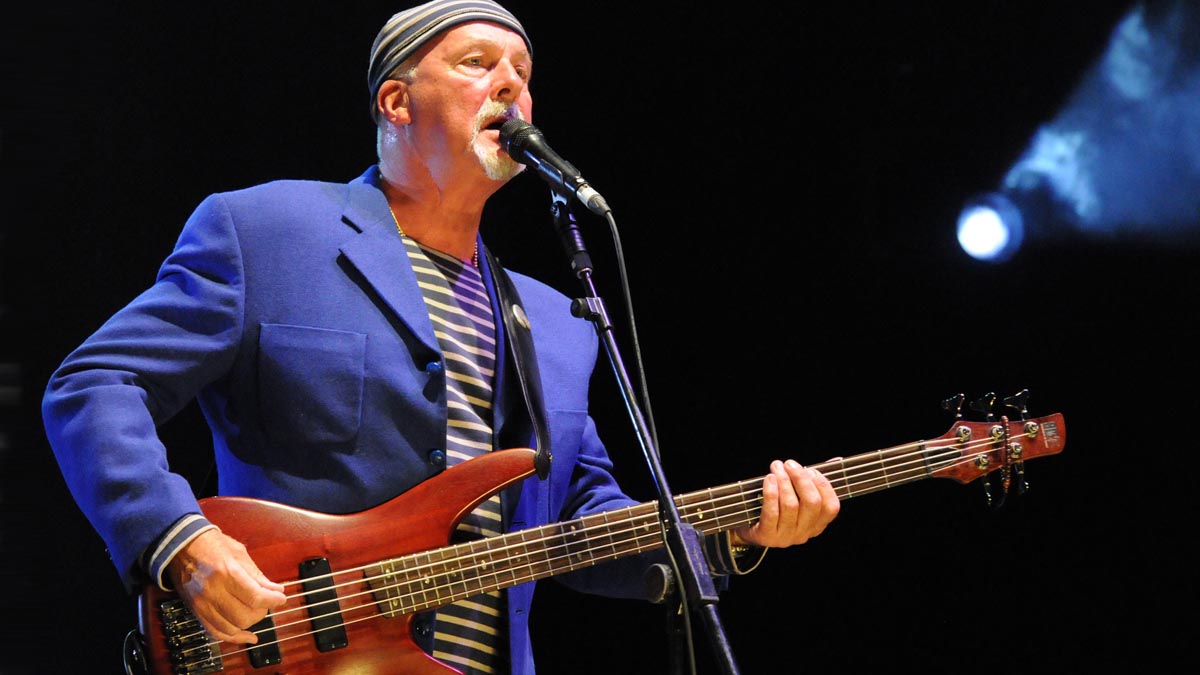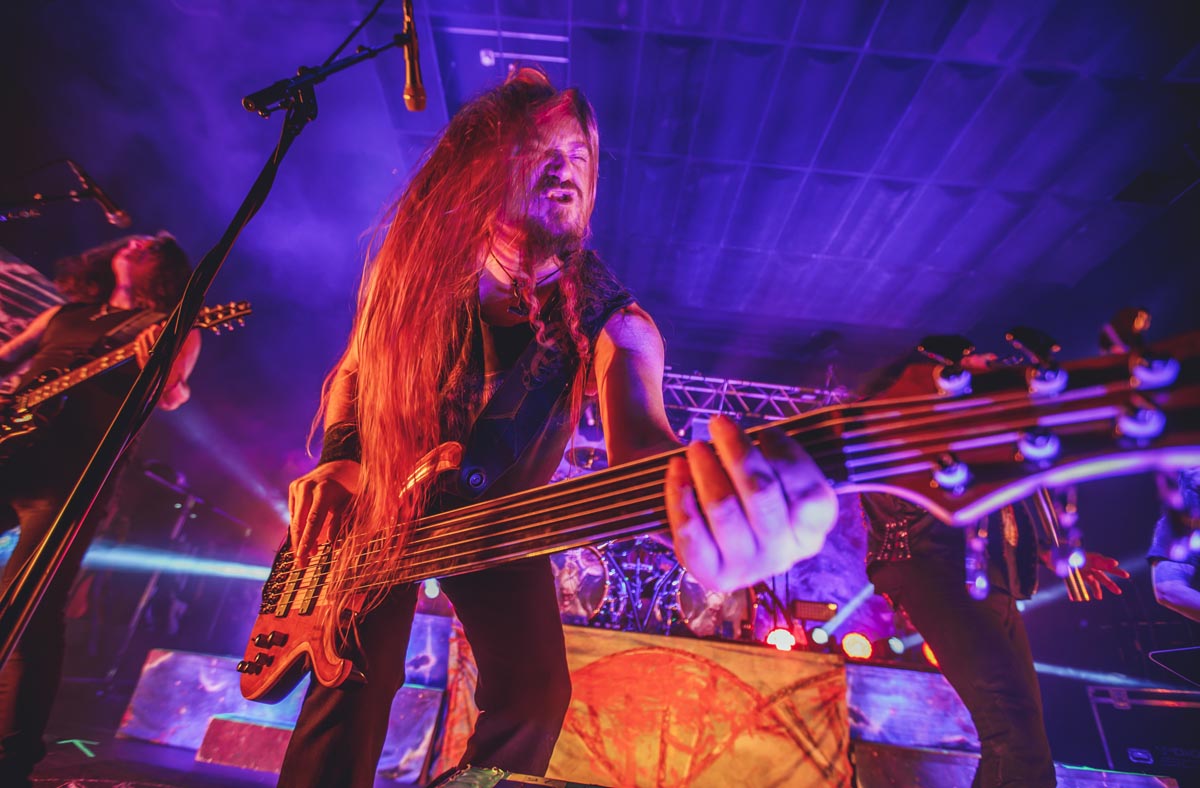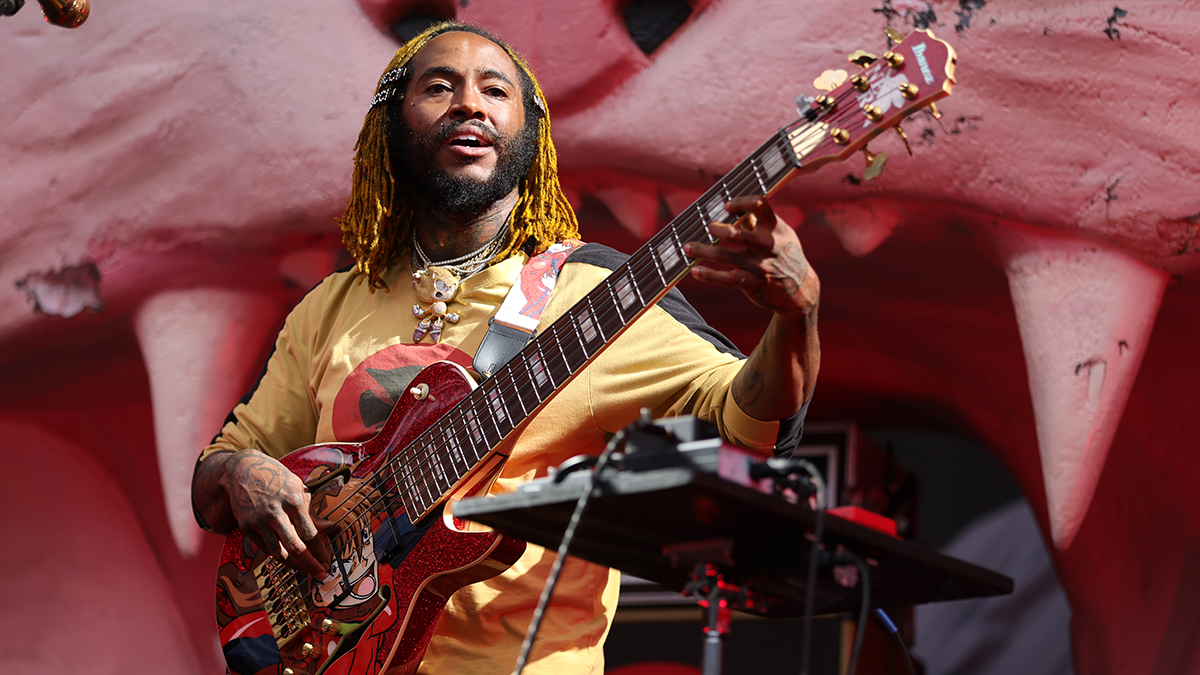Dave Pegg and Testament's Steve Di Giorgio talk Jethro Tull, folk rock, fretless bass and Fairport Convention
Worlds collide when a thrash legend meets his hero...

All the latest guitar news, interviews, lessons, reviews, deals and more, direct to your inbox!
You are now subscribed
Your newsletter sign-up was successful
Dave Pegg of Fairport Convention has been a leading light of the British folk-rock movement for half a century. Sessions with troubadours such as Nick Drake, Sandy Denny, and John Martyn cemented his reputation over the years, with a 15-year stint in Jethro Tull a particular influence on a generation of American bassists.
One of these is our guest writer Steve Di Giorgio, currently playing bass with thrash metal heavyweights Testament, who interviewed Pegg for us in an unlikely, but productive, collision of two very different worlds...
There were many fretless bass guitar players of various styles when I was young; the guys who were an influence on my journey to find my own sound were an assortment of individuals. I found something different in each of them, that shaped the way I went about my own voice.
These ranged in approach, from the highly proficient playing of Gary Willis; the smooth and silky approach of Tony Franklin; abstract and innovative lines from Mick Karn; and the king tone and technique of Jaco Pastorius, to name a few.
One of my favorite bands back then, along with Rush, Yes, Black Sabbath, Rainbow, Queen, and Iron Maiden, was Jethro Tull. Every musician in the band was extremely proficient and an interesting player – no matter the album or time period.

However, the bass player I initially focused on the most was John Glasscock, who played on some of Tull’s best albums. During the sessions for 1979’s Stormwatch, he got real sick and died at the age of 28. His bass is on a few songs, and the singer and bandleader Ian Anderson finished the bass tracks.
Tull’s next album, A, came out in 1980 and showed a new synth-based style, as the band walked into the new decade of sound. The bass now came from Dave Pegg, formerly and now of Fairport Convention, and I was immediately hooked on his sound. It was a familiar fretless tone, but not a familiar technique.
All the latest guitar news, interviews, lessons, reviews, deals and more, direct to your inbox!
The way the bass spoke its own voice clearly, yet supported the songs in traditional fashion, influenced me to emulate Pegg, as a new, young bass player trying to find an identity.
When in need of some inspiration these days – 40 years later – I still put on that album and marvel at that pleasantly obnoxious growl. For these reasons, it was a huge honor to ask Pegg about his approach to bass, then and now, for Bass Player magazine.
Hello, Dave. It’s quite an honor for me to be talking to you, trust me.
“Hello Steve! As it is for me to be talking to you. I’ve just had a look at your website and it looks pretty incredible. I’m honored.“
I met you once in California, while you were touring with Jethro Tull. It was in the early '90s. You guys had a stage set up like a small living-room, and you would invite members of the audience to come and sit up on the couches and serve them drinks.
The tour manager picked my little brother to come up, and we went backstage afterwards. You were the only one that was out and about, and we chatted about the bass on A – because I was obsessed with it – and you were all, ‘Shucks, that old thing!’ which was cool.
And then you got Ian Anderson to come out, and he said ‘Hi’ and shook hands and went back inside because he was harboring a cold. That was a real treat and you were a very nice guy.
“Ah, that’s great. I love meeting other bass players. We’re like drummers – we always hang out together, don’t we?“
Fairport Convention has a new album, Shuffle And Go. After 51 years since you joined this band, album sessions must go pretty smoothly?
“Yes, it’s pretty easy in Fairport. We’ve always been a band that sits around in the studio and works out our arrangements as we go along. Then everybody redoes their parts, for separation, and then we just leave our drummer Gerry Conway to put his stuff down and I put my bass down on top.
“We build it up individually, but we’ve generally got a good idea of what the end result is going to sound like. We have a lovely studio out in the British countryside, and we’ve recorded most of our albums there over the last 20 years. We’re really lucky, because stuff comes together pretty quickly.“
Who produces your albums?
“We have a wonderful engineer called John Gale, who mixes our live sound and also records us. He’s got younger ears than us, so we tell him to take the tracks away and do whatever he wants with them, and then we give him a co-producer credit. If I’m slightly out of time, or there’s some pitch queries, he puts everything right.“
Not like the old days, then.
“Definitely not. There are Fairport songs from the old days where you can hear the rhythm section slowing down, and you’re aware of it it afterwards, but then it’s too late. But it becomes a part of it – it’s all music, isn’t it?“
Which bass players did you admire back then?
“My favorite bass players when I started were obviously Paul McCartney and Rick Danko from the Band. I still listen to all that stuff. I wanted to be Rick Danko, and I had the great pleasure of meeting him on several occasions.
“In fact I had such a good time when I met him once in Denmark that I was hospitalized afterwards, for not being able to keep up with his whisky consumption. I had to have a stomach pump! Steve, I know you’re into fretless bass.
“Rick had one of those Ampeg fretless basses, and I bought a fretted version when I was on tour in America. I couldn’t get a sound out of it at all. On the next Band album, I saw that Rick had added a Precision pickup on it, which was how he got it to sound good.“
I was in awe of Jaco, obviously, because every time you heard him play it was unbelievable. He had such an instant gift
Are you equally happy playing fretted and fretless?
“To be honest, Steve, I never felt confident playing fretless bass, because my intonation wasn’t great. I was aware of that, although for some songs it didn’t really matter, because the actual noise of the bass really worked for the track.
“There are some great fretless bass players, and I don’t consider myself to be one of them. I was in awe of Jaco, obviously, because every time you heard him play it was unbelievable. He had such an instant gift.
“The other problem I had was that I’d started out as a guitarist, and I was predominantly using a pick at that time, as I still do. Fretless bass doesn’t really work with a pick; you have to use your fingers, which I did in order to get a good tone out of the Armstrong bass, and it sang. With a pick, it’s a different ball game.“
It’s the 40th anniversary of A this year. On that album there’s some really conspicuous, awesome bass playing. When I was in high school, I put the album on and I was blown away. For a moment in my life, I wanted to be Dave Pegg.
“Ha ha! Really?“
Yes, because I loved the way the bass reacted in the music. I liked the inflection of your playing. It was more than just ‘Hey, this is a fretless’. It had a very characteristic voice, and that’s what I liked. All the kids around me were like ‘Oh yeah, fretless means Jaco Pastorius’ but to me, fretless meant Jethro Tull, which I realize is odd to have as a fretless influence.
Just as you still listen to Paul McCartney, I’m still drawing inspiration from that album, as well as the other Tull records of course. Being a predominantly fretless bass player in extreme metal, it’s a bit outside of the norm, and I always go back to what brought me there.
“Well, at the time, there weren’t many fretless basses around in the UK. There was a guitar maker who lives in Coventry called Rob Armstrong, who became a good friend of mine. He built the fretless that I used on A. It was a real lump, but it had the most incredible ebony fingerboard and it sounded unbelievable.
“You plugged it in and it just sang – an incredible instrument. It had a Precision pickup on it and a Badass bridge. My late colleague Martin Allcock, who later joined Fairport Convention and was a great bass player and multi-instrumentalist, had the second one that Rob built. I used mine on a Fairport album before I joined Tull.“
While it’s an honor to be interviewed in this magazine, my style is melodic and suits songs and songwriters – I’ve never really been into techniques
So did you record with your fingers?
“Yes. I didn’t use that bass on any other Tull albums, although I may have used it on some Fairport albums. I don’t have it now. Someone bought it. When I split up with my wife in 2005, I had some fantastic instruments, but they just had to go, you know. When that happens to you, you get rid of a lot of possessions and life begins again.“
Did you ever feel more comfortable on fretless?
“No, I rapidly gave it up. I do have a fretless Precision these days, which a Fairport fan gave me, and I love its sound – but I don’t like playing it live because I know I’m going to play some really bum notes, ha ha!
“What’s got me back into fretless is having played a cello for the last few months, which is amazing because it’s almost the same scale as a bass guitar. I play mandolin too, so the finger positions are intuitive. Cello gives me a great buzz, especially with a bow, as a double bass owner, although you’ve got to be really good at double bass to play it well.“
Absolutely.
“All bass guitar players know that when you meet a professional double bass player, they go all the way up the fingerboard in every position and every key imaginable, and all the notes are right on the button, they’re so accurate. It’s a different world for us. The bass guitar has changed so much since the '70s, and so have the techniques that people use. I’m scared to look at them.“
What was your first ever bass guitar?
“My favorite bass ever was the first one I bought. I failed an audition as a lead guitarist with a group called the Uglys, and the singer Steve Gibbons said, ‘Oh Dave, our bass player’s leaving. If you want to join the band, we’d love to have you’.
“I told him I didn’t have a bass guitar, and he told me that the bass player was selling his 1962 Precision, which I bought. I used that on the A album as well. Later, when I was in Tull, I met Leo Fender. He was setting up G&L Guitars at the time and he signed my Precision for me with a wood engraver.“
Oh, that’s awesome.
“It was incredible, and he gave me a G&L bass as well, which he also signed. Sadly I had to part with both of those as well! So someone’s got them. I used that Precision bass on all of the Jethro Tull albums and the early Fairport albums that I played on.
“I put a Badass bridge on it and a Jazz pickup near the bridge, and had the neck shaved down to Jazz dimensions. It was a fantastic bass, and I used it on the Nick Drake albums. He was a great singer-songwriter who sadly passed away at a very early age.
“One of my favorite albums that I ever played on was Bryter Later, by Nick, which became quite big in the States. Fans of singer-songwriters will know that album. In terms of how I think of myself as a bass player, while it’s an honor to be interviewed in this magazine, my style is melodic and suits songs and songwriters – I’ve never really been into techniques.“
You also played with the late John Martyn. Did he ever give you any direction about the bass?
“There’s one song, Dancing, which was released as a single. It has that classic C, Am, F, G sequence, and it was produced by Chris Blackwell, who used to run Island Records. It was recorded at Island’s studios in Portobello Road in London.
“There were lots of West Indian bass players around, but John wanted us to sound Jamaican even though we were weren’t Jamaican. We did our best. I love reggae, but he really hated what I played over that chord sequence. I played with Jimmy Cliff, too, the first time he came over here – I was in his backing band. That was great fun.“
A lot of fingerstyle players sound really woolly, which really frustrates me because I want to hear what they’re playing. So I’m not ashamed of using a pick
What bass gear are you using these days?
“I’ve been using a five-string bass for the last 20 years or so. I’ve always used Ibanez Soundgear, which are great because they’re not heavy and I’ve got back problems, like many bass players of my age.
“I use Elixir strings on bass and mandolin: I can get 60 gigs out of a set of those. For amps, I’m using one of those little Fender Rumbles, a 40-watt one. You can pick it up with your little finger, it’s absolutely fantastic. We don’t need big amplifiers with Fairport, because everything goes out front via the DI.
“And I use the Kala Ukelele bass, which sounds unbelievable, on the new album. You don’t have to play the rubber strings – they have flatwounds too, which greatly improves the intonation.“
It’s 51 years this year since you joined the Fairports.
“Yes, and most of our songs are still in D, E, or G!“
Has your bass playing changed much in that time?
“Not really. I still use a pick, which some people think is a bit weird, but it stands out well. A lot of fingerstyle players sound really woolly, which really frustrates me because I want to hear what they’re playing. So I’m not ashamed of using a pick, and anyway I’ve got no choice because I can only play slow things with my fingers.
“And I never learned slap bass. I’m hopeless at slap playing. My son Matthew, who is a great bass player and plays with Procol Harum and Rick Wakeman, discovered Level 42 when he was 14, and for years all you heard in our house was Mark King bass-lines, ha ha! He got really good at it. I don’t have the technique, unfortunately.“
Well, thank you for the interview, Dave. It’s been great talking to you.
“Likewise. It’s a huge honor, especially as I don’t view myself as a great bass guitar player – more as a bass guitar owner...“
